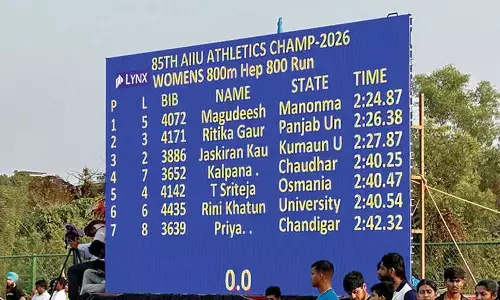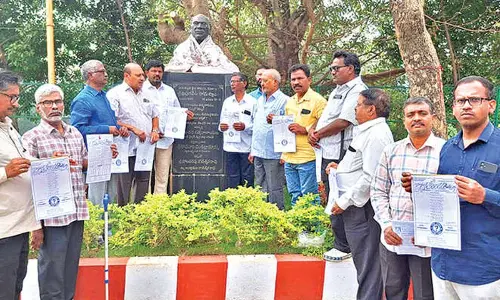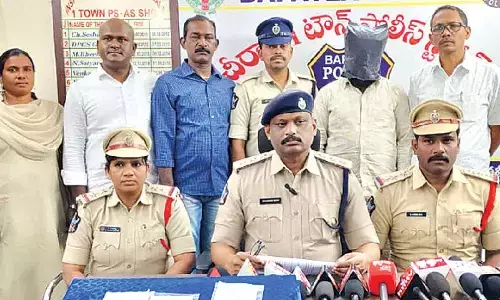CCTV cameras in courts, a laudable move

The anxiety and concern of the apex court to root out corruption from the judiciary right from the top to bottom is understandable. Its untiring efforts to see that the directions given to the government and the High Courts for the installation of CCTV cameras in all courts throughout the country
The anxiety and concern of the apex court to root out corruption from the judiciary right from the top to bottom is understandable. Its untiring efforts to see that the directions given to the government and the High Courts for the installation of CCTV cameras in all courts throughout the country at the earliest are laudable. In fact, following these directions in most of the High Courts and lower courts, particularly in major cities, CCTV cameras have already been installed.
Still one should be sceptical about the results of such a move. Obviously, the purpose of installing the CCTV cameras is to warn the corrupt elements in the court that should they indulge in accepting bribe they would be caught “red-handed” on camera and the criminal proceedings would follow. But in practice, the CCTV cameras would hardly prove effective to curb the all- pervading menace called corruption.
The chronically corrupt elements working in various courts know how to evade the vigilant eye of the CCTV cameras. Obviously, these cameras can never be expected to cover every nook and corner of the court precincts. The bribe money can be taken at any place in the vicinity of the court premises and of course, at home or through middlemen. Further, daily upkeep of these cameras and taking note of the “goings-on’ captured in these cameras requires to be ensured. Otherwise, the whole exercise would become futile.
Going by the version of the regular visitors to courts where the CCTV cameras have been functioning since quite some time, corruption has not stopped or even reduced. The business is going on as usual, albeit with added caution. The reason for such a pitiable situation is clear.
The court staff do know pretty well where these cameras are installed, and which sites are vulnerable, and which are not. Besides, even if a judicial staff is caught accepting the bribe, the head of the concerned court is unlikely to take stern action because of the powerful “Unions” or “Associations” who could be used as shield by the erring member.
Therefore, instead of living in utopia let the well-meaning highest judiciary widen the legal dragnet and sharpen the law to see that no corrupt judicial employee goes scot-free. To start with let there be a crackdown on the “big bosses” who control the respective staff unions or associations. Their incomes, properties and additional money churning activities should be scrutinised so also their benami dealings in the names of their relatives. The police personnel entrusted to do these tasks should be upright, honest and efficient. They must be sensitised thoroughly to ensure that the corrupt is caught without any delay. Summary trial of such accused would instil faith in the justice delivery system. Unless a few corrupt elements are severally punished, and their guilt is brought to the limelight, it would be difficult to tame the corrupt elements in judiciary.
No mercy for corrupt
In a judgment delivered recently in Uttarakhand Transport Corporation Vs. Sukhveer Singh (Civil Appeal No. 18448 of 2017) the Supreme Court while upholding dismissal of a bus driver from the service of the State-owned Uttarakhand Transport Corporation, held that acts of corruption/misappropriation cannot be condoned, even in cases where the amount involved is meagre.
The apex court set aside the judgement of the High Court by observing that it did not examine whether any prejudice was caused to the delinquent employee by non-supply of inquiry report and show-cause notice.
The bus driver was charged with the allegation that he colluded with the conductor and did not stop the bus when inspection team signalled it to stop, as there were 61 ticketless passengers in the bus. The Court observed that mere non-supply of the inquiry report does not automatically warrant reinstatement of the delinquent employee and it is incumbent upon the delinquent employee to plead and prove that he suffered a serious prejudice due to the non-supply of the inquiry report.
Thus, the latest judgement defers from the views expressed in Managing Director, ECIL, Hyderabad & Ors Vs. B. Karunakar.
Deposit Rs 2 cr for SLP listing again: SC
A division bench of the supreme court has directed the appellants, Ambani Builders Private Limited to file an affidavit about the steps taken to prevent fire hazards and disposal of municipal waste and deposit an amount of Rs.2 crores within four weeks in the court registry to ensure that the matter is listed again.
The bench of Justices Madan B Lokur and Deepak Gupta were dealing with a case involving unauthorised construction of a high-rise residential-cum-commercial complex in Vadodara, Gujarat.
In the impugned judgment, the High Court had held that since the builder had already sold certain number of flats to the customers, third party rights have been created, and therefore, it would not be proper to pass the order of demolition of such construction. The High Court had directed the builder to deposit, as development charges, an amount of Rs.4,81,13,500 within a period of six months from June 27 to the Corporation, of which Rs.2,40,00,000 were to be deposited within eight weeks. The High Court had insisted on the deposit of this amount conditional for the vacation of its stay on further construction. The stay was granted on October 21, 2015.
Ordinance
The new Ordinance proposed by the Central government would ensure that the bank loan defaulters are not allowed to compete in a bid for the auction of stressed assets.
Dr H C Upadhyay

















